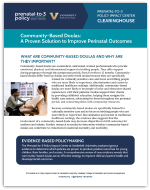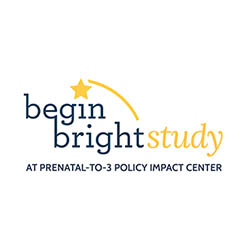Access to community-based doulas promotes healthier and more equitable infant birth outcomes, maternal and child health, and nurturing and responsive parenting.
Community-based doulas are nonmedical, unlicensed, trained professionals who provide emotional, physical, and informational support to birthing people. They offer support during pregnancy through the postpartum period, from 6 weeks to 12. Community-based doulas differ from lay doulas and other birth doulas because they are specifically trained for culturally sensitive care and focus on birthing people who are more likely to experience discrimination and racism in traditional healthcare settings. Additionally, community-based doulas are more likely to be people of color and often have shared experiences with their patients.
Access to community-based doulas is proven to help address parental wellness, child-parent relationships, and child health and development. Positive outcomes include increased attendance at medical appointments and childbirth education classes, increased breastfeeding initiation, decreased rates of preterm birth and low-birth weights, and improved overall parenting practices.
The non-clinical care provided by community-based doulas can have a positive impact on expectant mothers—the emotional, physical, and informational support from a doula can empower them to navigate a complicated medical system and advocate effectively for their needs. The evidence is clear that, as a member of a comprehensive system of maternal care, a community-based doula is effective at improving outcomes.
Download

|
Community-Based Doulas: A Proven Solution to Improve Perinatal Outcomes |
Learn more and read the full Community-Based Doulas Evidence Review in the Prenatal-to-3 Policy Clearinghouse.



